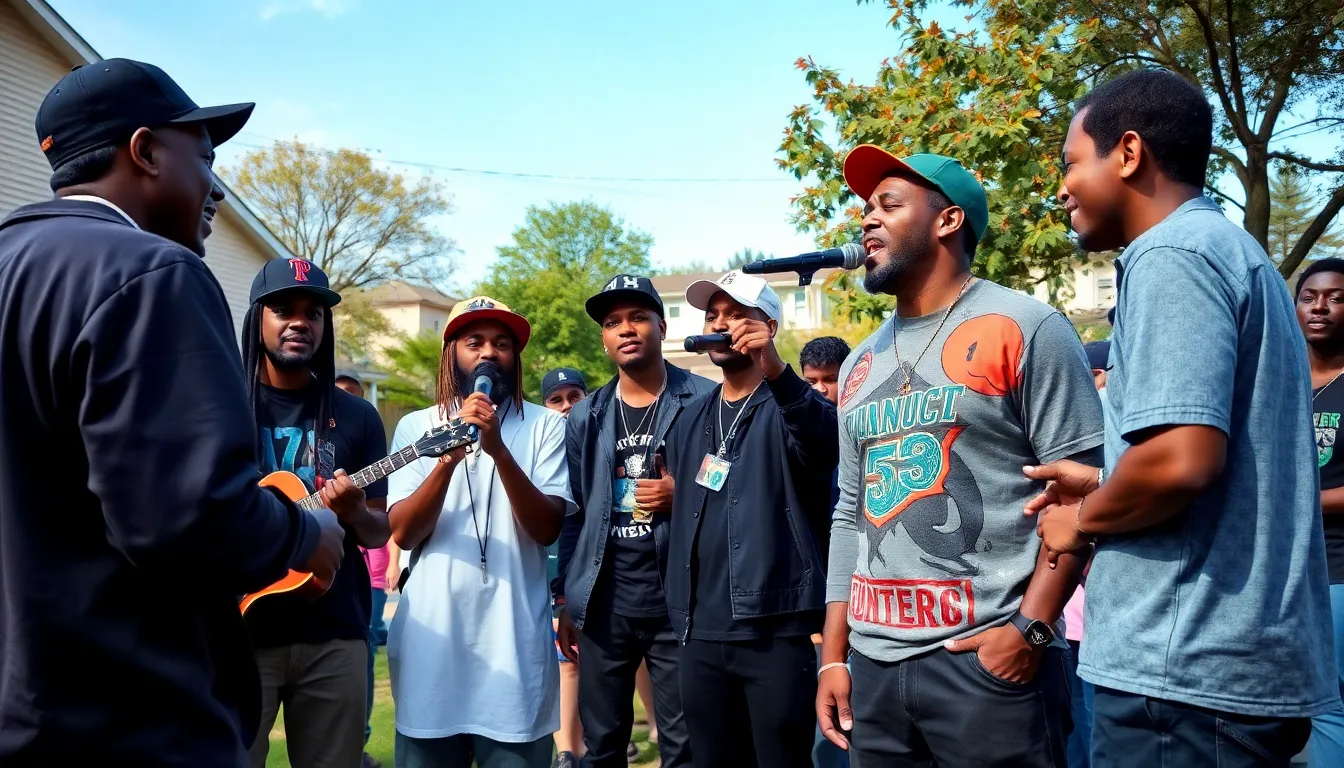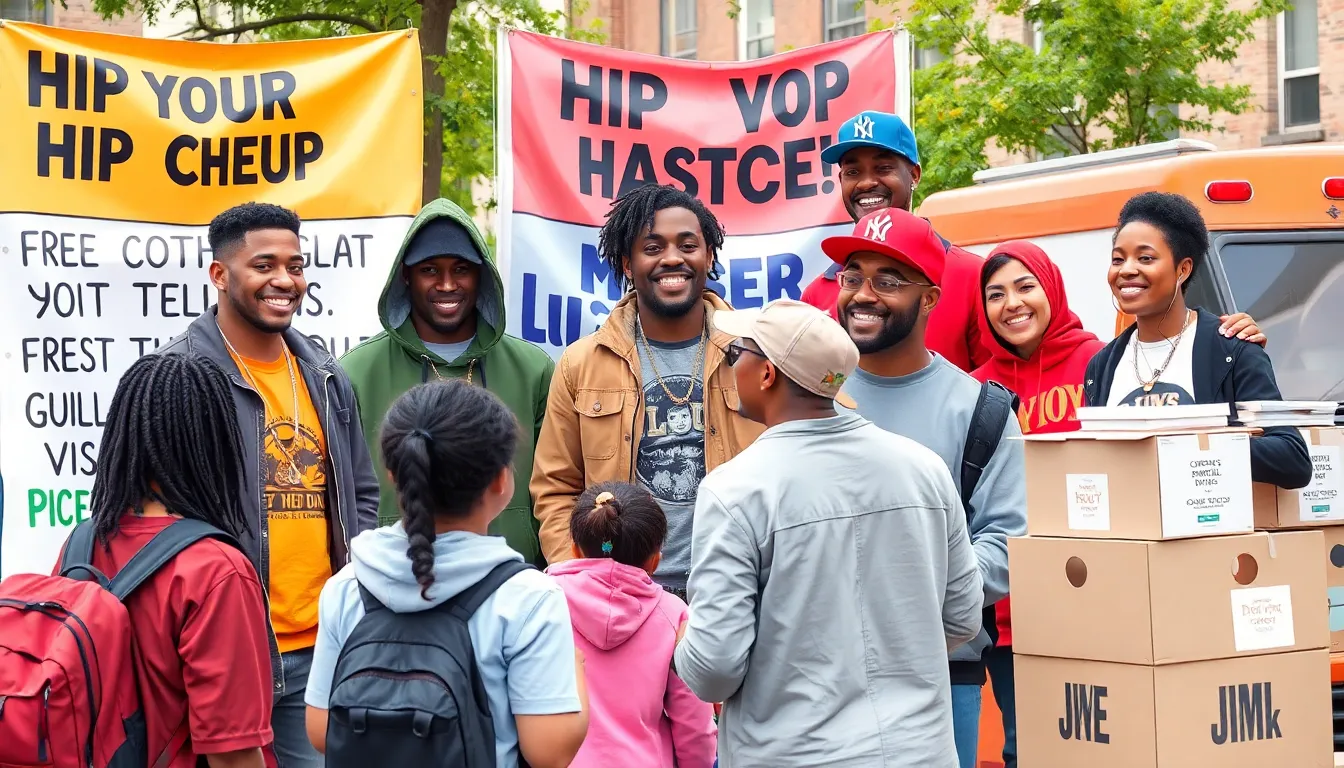Table of Contents
ToggleHip-hop isn’t just about beats and rhymes; it’s also about giving back. While artists drop bars about their struggles and triumphs, many are stepping up to make a difference in their communities. Hip-hop philanthropy is a powerful movement where creativity meets compassion, proving that you can indeed turn the mic into a megaphone for change.
Understanding Hip-Hop Philanthropy
Hip-hop philanthropy represents a significant intersection of culture and social impact. Artists leverage their influence to address pressing issues within their communities.
The Origins of Hip-Hop Philanthropy
Hip-hop philanthropy began in the late 20th century, with pioneers recognizing the power of music to inspire change. Figures like MC Lyte and Run-DMC initiated charitable efforts, aiming to uplift communities often overlooked. By promoting awareness, they set the foundation for future initiatives. Grassroots projects flourished, highlighting a genuine commitment to social justice. This legacy emphasized that hip-hop could tackle societal issues while uniting fans around a common cause.
The Evolution of Philanthropic Efforts
Philanthropic efforts within hip-hop evolved significantly in the 21st century. Increased awareness of social injustices prompted artists to take a stand publicly. Campaigns like “Artists for Peace” and “Hip Hop for Change” mobilized artists and fans alike. Digital platforms expanded the reach, enabling quick donations and widespread participation. Furthermore, collaborations with established nonprofits exemplified strategic partnerships aimed at addressing educational needs and health disparities. These evolving efforts showcase a growing sense of responsibility among artists to impact their communities positively.
Key Contributors to Hip-Hop Philanthropy

Numerous influential figures and organizations play pivotal roles in hip-hop philanthropy. These contributors leverage their platforms to create meaningful change in their communities.
Influential Artists and Their Causes
Artists like Jay-Z, Chance the Rapper, and J. Cole drive philanthropic efforts. Jay-Z’s Shawn Carter Foundation focuses on educational opportunities for students. Chance the Rapper champions mental health initiatives through his nonprofit, SocialWorks. J. Cole supports various causes, including education and justice reform, engaging fans to participate actively. These artists highlight social issues while using their visibility for impactful change.
Nonprofits and Organizations in the Scene
Organizations like the Hip-Hop Caucus and The Dream Corps epitomize the blend of hip-hop and social activism. The Hip-Hop Caucus mobilizes artists and communities to advocate for climate, racial, and social justice. The Dream Corps, founded by Van Jones, works to promote social equity and economically empower underserved communities. Collaborations between these nonprofits and hip-hop artists amplify outreach and engagement, emphasizing grassroots efforts that resonate within communities.
Major Initiatives and Campaigns
Hip-hop artists actively engage in philanthropy through various significant initiatives and campaigns that highlight their commitment to social change. These efforts often focus on critical issues within vulnerable communities.
Notable Events and Fundraisers
Annual events like the “Hip Hop Summit Action Network” gather artists and activists to address community concerns. These summits offer platforms for discussions on issues like education and social justice. “The BET Hip Hop Awards” also feature philanthropic components, showcasing artists who contribute a portion of their proceeds to local charities. Fundraisers led by Chance the Rapper exemplify individual commitment, with events raising substantial funds for mental health awareness. Such gatherings foster community spirit and highlight the hip-hop industry’s dedication to philanthropy.
Successful Partnerships in Philanthropy
Collaborations between hip-hop artists and established nonprofits enhance philanthropic efforts. The “Hip-Hop Caucus” connects artists like J. Cole to advocacy campaigns for social and racial justice. Partnerships with organizations such as “DoSomething.org” empower young people in community projects. Additionally, Jay-Z’s Shawn Carter Foundation partners with educational institutions to provide scholarships. Strategic alliances between artists and nonprofits create impactful initiatives that address pressing societal needs and amplify community outreach.
Impact of Hip-Hop Philanthropy
Hip-hop philanthropy significantly transforms communities through concerted efforts from artists. Engaging support from the hip-hop community addresses critical issues like education and health.
Community Development and Support
Artists prioritize community upliftment through strategic initiatives. Programs often focus on education, providing scholarships and mentorship opportunities for students. Many initiatives directly support local businesses, fostering economic growth in underprivileged neighborhoods. Collaborations, such as concerts and awareness campaigns, generate funds for community-building projects. Nonprofits work closely with hip-hop artists to identify pressing needs that require immediate attention, enhancing collective outreach.
Cultural Influence and Awareness
Cultural impact extends beyond music into social consciousness. Artists use their platforms to raise awareness about injustices, inspiring fans to take action. Many hip-hop figures speak out against systemic issues, encouraging discussions on topics like racial equality and mental health. Campaigns initiated by these artists resonate deeply with younger audiences, driving social movements. Through partnerships with educational organizations, they broaden awareness on cultural and societal challenges that affect communities nationwide.
Challenges and Criticisms
Hip-hop philanthropy faces several challenges and criticisms despite its positive impact. Many voices within the industry question the authenticity of artists’ motivations. Critics often argue that some individuals leverage philanthropy for personal gains or publicity rather than genuine commitment.
Issues Within the Industry
Tensions exist surrounding financial transparency among philanthropic ventures. Artists and organizations frequently struggle to demonstrate clear impact with donations. Lack of accountability raises questions about whether funds reach their intended communities. Additionally, the pressure to maintain relevance can lead artists to focus on image over substance. Some philanthropic efforts, despite good intentions, fall short in addressing systemic issues, particularly in underserved areas. Mismanagement of resources can hinder meaningful change.
Addressing Stereotypes and Misconceptions
Addressing stereotypes poses another challenge for hip-hop philanthropy. Many people view hip-hop culture solely as a vehicle for materialism and violence, obscuring its social contributions. Artists continuously strive to reshape these narratives by showcasing their community initiatives. They often highlight educational programs and health campaigns to counter negative perceptions. In many cases, initiatives focus on upliftment rather than perpetuating stereotypes. Engaging storytelling serves as a powerful tool for artists to challenge misconceptions about their culture. By demonstrating the philanthropic spirit within hip-hop, they inspire fans and critics alike to view the movement through a lens of social responsibility.
Hip-hop philanthropy represents a powerful fusion of culture and social responsibility. Artists are not just entertainers; they’re change-makers who leverage their influence to uplift communities and address pressing issues. Through strategic initiatives and collaborations, they inspire action and drive awareness around social justice, education, and health.
Despite facing challenges and criticism, the movement continues to grow, reshaping perceptions of hip-hop as a force for good. By prioritizing community engagement and transparency, artists can further solidify their commitment to philanthropy and foster lasting impact. The ongoing evolution of hip-hop philanthropy serves as a testament to the genre’s ability to inspire change and empower future generations.




